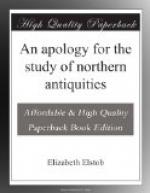Again,
In Pictures none hereafter
will delight,
You draw more to the Life
in black and white;
The Pencil to your Pen must
yield the Place,
This draws the Soul, where
that draws but the Face.
But having thank’d these noble Lords for their Suffrage, we will proceed to some other Witnesses of Quality: And first I beg leave to appeal to my Lord Duke of Buckinghamshire, his Translation of The Temple of Death;
Her Chains were Marks of Honour
to the Brave,
She made a Prince when e’er
she made a Slave.
Again,
By wounding me, she learnt
the fatal Art,
And the first Sigh she had,
was from my Heart.
My Lord Hallifax’s Muse hath been very indulgent to Monosyllables, and no Son of Apollo will dare to dispute his Authority in this Matter. Speaking of the Death of King Charles the Second, and his Improvement of Navigation, and Shipping; he says,
To ev’ry Coast, with
ready Sails are hurl’d,
Fill us with Wealth, and with
our Fame the World.
Again,
Us from our Foes, and from our selves did shield.
Again,
As the stout Oak, when round
his Trunk the Vine
Does in soft Wreaths, and
amorous Foldings twine.
And again,
In Charles, so good
a Man and King, we see,
A double Image of the Deity.
Oh! Had he more resembled
it! Oh why
Was he not still more like;
and cou’d not die?
My Lord Landsdown’s Muse, which may claim
her Seat in the highest
Point of Parnassus, gives us these Instances
of her Sentiments in our
Favour;
So own’d by Heaven,
less glorious far was he,
Great God of Verse, than I,
thus prais’d by thee.
Again on Mira’s singing,
The Slave that from her Wit
or Beauty flies,
If she but reach him with
her Voice, he dies.
In such noble Company, I imagin Mr. Addison will not be ashamed to appear, thus speaking of Mr. Cowley;
His Turns too closely on the
Reader press;
He more had pleas’d
us, had he pleas’d us less.
And of Mr. Waller,
Oh had thy Muse not come an Age too soon.
And of Mr. Dryden’s Muse,
Whether in Comick Sounds or
Tragick Airs
She forms her Voice, she moves
our Smiles or Tears.
And to his Friend Dr. Sacheverell,
I’ve done at length,
and now, dear Friend, receive
The last poor Present that
my Muse can give.
And so at once, dear Friend
and Muse, fare well.
To these let me add the Testimony of that Darling of the Muses, Mr. Prior, with whom all the Poets of ancient and modern Times of other Nations, or our own, might seem to have intrusted the chief Secrets, and greatest Treasures of their Art. I shall speak only concerning our own Island, where his Imitation of Chaucer, of Spencer, and of the old Scotch Poem, inscribed the Nut-Brown Maid, shew how great a Master he is, and how much every thing is to be valued which bears the Stamp of his Approbation. And we shall certainly find a great deal to countenance the use of Monosyllables in his Writings. Take these Examples;




